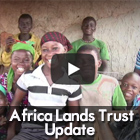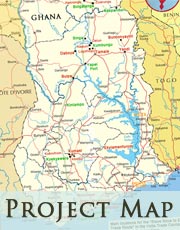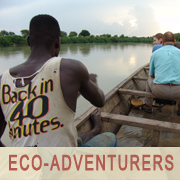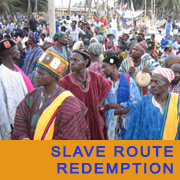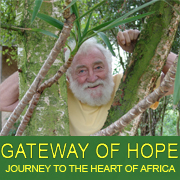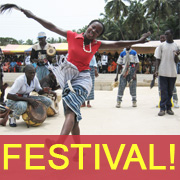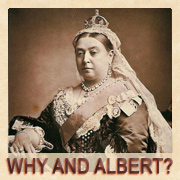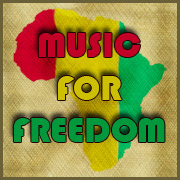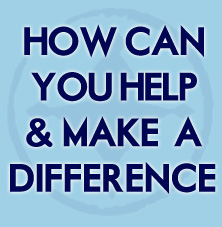And Albert Foundation - Who is David Murden from Costis on Vimeo.
David Murden, an NHS Clinical Psychologist and Psychotherapist, had built a Crafts "Cooperative" centre in old Victorian buildings near Beverley Minster which he opened in 1987. In 1988 his "hobby" involving antiques, woodcrafts, and crafts from abroad gave rise to the first showroom which was immediately successful as were the many individual businesses, 23 in the first year alone, created by trying to put others first! Hence the name, "Bloggs"…and Albert. Albert′s never been found yet!
To obtain the crafts in sufficient amounts David had to travel to see what was available. First of all Nigeria in 1992 with a Nigerian friend, Joe Esiri, and quickly followed by Java and Bali, Cambodia, Thailand, Malaysia and Burma to obtain fairly traded crafts for And Albert′s shop expansion which quickly followed in up to 12 places in the country′s High Streets.
The strong idea of creating an ethical trade with craftspeople during his travels was begun in earnest in 1993 in Niger and Burkina Faso. And Albert continues today and with its focus on indigenous workshops, is still supporting many villages in the developing world.
Almost 15,000 indigenous kinds of crafts have been tried, tested and modified for UK retail and wholesale markets during the time since. They are still being sold by its extensive network of "fair traders" who remain enthusiastic for this model to continue.
But the setting up and support of successful workshops, and the many families of craftspeople who benefit from the sales, didn′t end with a few big orders throughout the years…
 We allow trading to create long term friendships, partnerships, and trust with whole villages! Grass roots development means everything done has to be transparent, sustainable and of benefit to the whole community. Thus the need arose for the Foundation to be born which could help fund not only the infrastructure of workshops but all the attendant underlying primary needs of the village and its families. A tall order requiring careful planning, patience, and perseverance in abundance!
We allow trading to create long term friendships, partnerships, and trust with whole villages! Grass roots development means everything done has to be transparent, sustainable and of benefit to the whole community. Thus the need arose for the Foundation to be born which could help fund not only the infrastructure of workshops but all the attendant underlying primary needs of the village and its families. A tall order requiring careful planning, patience, and perseverance in abundance!
First of all, you must VISIT WITH and stay with people in their villages, getting to know them, their hopes and dreams for their children, and MAKING SURE THEY SAY WHAT THEY WANT TO HAPPEN TO HELP THEM ACHIEVE SUSTAINABLE LIFESTYLES. It′s not our grandiose Western charity ideas we are imposing on them to make us look good or prise funds from sentiment…It′s what we can accomplish together in situations where their skills have already triumphed and kept them going through many generations of difficulty. Secondly, INTERACTION AND INVESTMENT ,these are key to our model: shared ideas first, investment in them together-no easy handouts-and primary needs met as a motivator and spur to yet more creativity between us all.
The "poor" have often learned to be helpless, depressing for any human being; what we do together begins a transforming process of hope which produces work and economic development. This is done with often very MEAGRE RESOURCES and has proved time and again those in poverty only want a small initial help to become independent and create sustainable development.
 Making string and rope from local plants, for hut building, tethering, nets for fishing etc.
Making string and rope from local plants, for hut building, tethering, nets for fishing etc.
Although the Foundation is still in touch with its network of crafts producers around the world, and still linking them to our market for actual orders, we have focussed in the last few years in developing this model in an African setting and little by little testing this careful INTEGRATIVE APPROACH in our often remote areas of West Africa. We leave you to judge what we have done, whether it is truly ethical, and if our ongoing strategy is putting us in the forefront for wise present investment. (see Ploughsharers page)
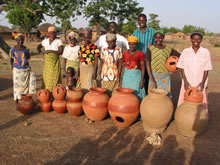 Many tens of thousands pounds worth of crafts imported and sold in the UK via whole container loads since 1993. So much of these, empowered women to obtain greater independence and freedom from reliance on often one subsistence crop a year. In just one village, the Chief and men folk said this had meant their wives no longer nag them for money!
Many tens of thousands pounds worth of crafts imported and sold in the UK via whole container loads since 1993. So much of these, empowered women to obtain greater independence and freedom from reliance on often one subsistence crop a year. In just one village, the Chief and men folk said this had meant their wives no longer nag them for money!
Please help us expand our working integrative approach in hundreds more viilages!
Click here if you would like to make a donation to And Albert Foundation
Click here to find out what Ploughsharing is all about
Click here to contact us about anything you’ve seen on this website or if you would like to help in whatever way you can.

